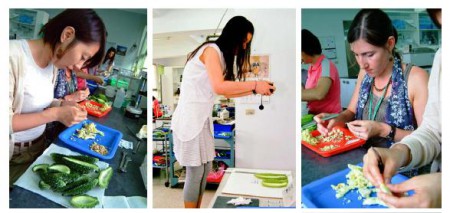- Official confirmation of the need for better crop growth models.
- More on CIP’s high-tech spud bank. In other news, CIP also has banks of other Andean roots/tubers, but don’t get me started on that one.
- “FAO has relegated organic agriculture to a footnote in the discussion of food security in the long run.” Fighting talk. Wonder if that will change with the new DG.
- Cook like an Inuit.
- Cultivating medicinal plants in India. Let’s see how that goes.
- Wanna study the Maya nut?
- More great Guardian infographics, aquatic edition.
- “This one tastes like cotton candy.” Breeding strawberries the hard way.
Nibbles: Median strips, Vitamin A, Mapping in Kenya, Chaffey, Small farms, Rennell Island coconuts, Sweet potato breeding, Acacia nomenclature, Crop models, Pulque, Fruits
- Planting roadsides with natives, including crop wild relatives. And here comes the database.
- Orange Maize: The Movies.
- VirtualKenya really here. Mother-in-law beside herself.
- Plant Cuttings is out. And all of a sudden I’m in a much better place.
- Small is beautiful, farm edition. And as chance would have it, coffee farm edition. And urban edition.
- Dispute at iconic coconut plantation resolved. Apparently there are some really unique varieties there.
- I say boniato. For the first and last time.
- Acacia on the brink. Easy, tiger. The name, not the genus.
- We’re going to need a better model.
- Pulque comes back. Never knew it had gone away.
- Domesticating fruit trees in Kenya. Something for VirtualKenya?
Making the most of bitter gourd diversity at AVRDC
Another interesting agrobiodiversity piece in AVRDC’s newletter today:
The AVRDC Nutrition group is locked in a struggle with a cucurbit – and so far, warty Momordica charantia appears to be winning! As part of the project “A better bitter gourd: exploiting bitter gourd to increase incomes, manage type 2 diabetes, and promote health in developing countries,” researchers have begun preparing samples of the vegetable for later laboratory analysis.

Interested? “Like” the project’s Facebook page then!
Nibbles: Seed savers, Lemons, Assam Rice, Striga control, Amaranth, Bearded pigs, Banana, Early nutrition
- Seed savers: everyone’s got an angle, from Seeds of Hope and Change to Seed Bank Bingo.
- Italian lemons enjoying a renaissance. In California, natch.
- India registers Assam farmers’ traditional rice varieties. In other news, rice water “is also used as shampoo, according to community elders”.
- US$9 million to “implement and evaluate four approaches” to controlling Striga in Africa. One day we’ll know.
- Denver Botanic Gardens does amaranth.
- Evolution of bearded pigs. Good to know. Good to eat?
- Bioversity banana team guest blogs at Annals of Botany. But surely they have a blog of their own. No, wait…
- Agriculture is bad for your health.
Brainfood: Soil, Seed aging, Organic sustainability, Yaquis, Garlic, Rice bean, Ethiopian livestock, Sweet potato intercropping, PES
- Long-term effect of tillage, nitrogen fertilization and cover crops on soil organic carbon and total nitrogen content. No till is better than conservation tillage.
- Catalase is a key enzyme in seed recovery from ageing during priming. It sure is. Good to know.
- Sustainable agriculture: A case study of a small Lopez Island farm. The authors conclude: “the need for future targeted nutrient inputs cannot be ruled out for sustainable long-term production”.
- Evolution of the knowledge system for agricultural development in the Yaqui Valley, Sonora, Mexico. They’re innovative, and diversity promotes agility.
- Changes in phenolic compounds in garlic (Allium sativum L.) owing to the cultivar and location of growth. Don’t hold your breath; only 10 varieties.
- Morpho-physiological and nutritional characterization of rice bean (Vigna umbellata). Now that’s what I call science; 30 varieties.
- Rural livestock asset portfolio in northern Ethiopia: a microeconomic analysis of choice and accumulation. Many, many factors come into play.
- Sweet potato (Ipomoea batatas L.)-based strip intercropping: I. Interspecific interactions and yield advantage. Almost every intercrop improves yield and bottom line.
- Should payments for biodiversity conservation be based on action or results? A model says: “It depends.”